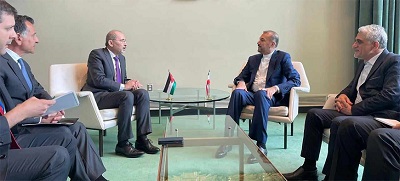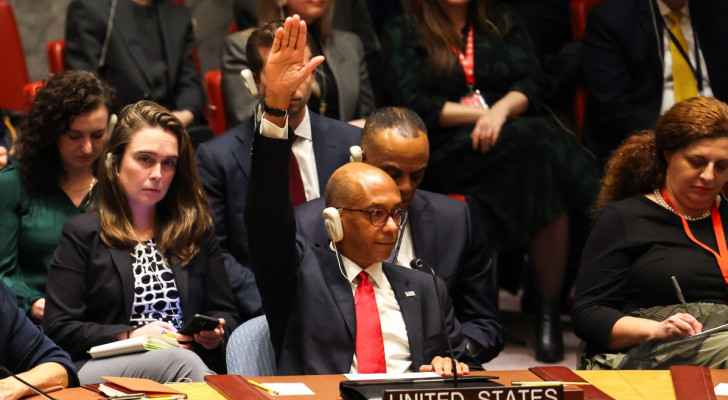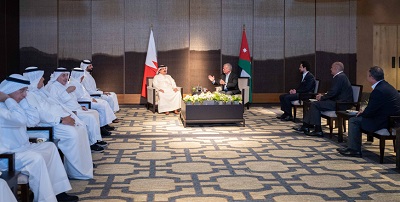Trump Pardons Another Celebrity Criminal - By Michael J. Green, Foreign Policy
In Singapore on Tuesday, the president of the United States demonstrated that he has the authority to give unconditional pardons not only to felons at home, but also on the international stage. North Korean leader Kim Jong Un’s regime has violated multiple United Nations Security Council resolutions by continuing to test ever more dangerous ballistic missiles and nuclear weapons and was found guilty of crimes against humanity by a U.N. Commission of Inquiry in 2014. In Singapore, U.S. President Donald Trump announced that he trusted Kim, said it was an honor to meet him, and declared peace on the Korean Peninsula. The situation on the peninsula is so horrible in terms of human suffering and threats to peace that one wants to hope for the best with this diplomatic pageant. Maybe I am just another “hater and loser” — but parsing what we know thus far, it is hard to see what we have achieved for the North Korean people or the safety of the world in exchange for pardoning Kim.
It is clear what Kim achieved. First, after two decades of North Korean leaders trying to lure a U.S. president to give de facto recognition to the regime for its nuclear weapons achievement, Kim struck gold. Isolated because of his nuclear weapons program, until recently Kim could not even score a meeting with Chinese President Xi Jinping, the leader of North Korea’s only ally. Now, he has two meetings with Xi, two with South Korean President Moon Jae-in, and a meeting with Trump under his belt, with who knows how many more to come. Second, Kim has blunted the “maximum pressure” he knew he would face after escalating his missile and nuclear tests. The United States may keep sanctions on for the duration of talks, but China — which accounts for 90 percent of North Korean trade — has already visibly backed off from sanctions pressure on the North. Even U.S. sanctions, which the government significantly strengthened last September, require active application against North Korean and third-country entities, and that appears to be off the table. Third, Kim won an unexpected bonus with Trump’s commitment to end annual military exercises with South Korea a unilateral pledge that blindsided South Korea and Japan and that will leave U.S. forces less prepared to deal with a North Korean military that is no less dangerous than it was before the Singapore summit. Even more stunning was Trump’s claim that he would eventually like to withdraw troops from Asia, an alliance-rattling statement that will warm hearts in Beijing and Moscow.
What did Trump achieve beyond high television ratings? He was not talking about fire and fury, at least — but the president should not have used those threats of war in the first place when a strategy of speaking softly and carrying a big stick would have been more effective and gained far more support among U.S. allies and in Congress. It is good that North Korea has ceased testing missiles and nuclear weapons, but that is instantly reversible and arguably not worth the irreversible gains Kim pocketed in terms of de facto sanctions relief and prestige. Kim’s “firm and unwavering commitment” to denuclearization is the same “firm and unwavering” commitment the regime made before embarking on a series of nuclear and missile tests in the last round of diplomacy. Pyongyang has figured out that nuclear weapons states make that pledge to join the club: In Article VI of the Treaty on the Non-Proliferation of Nuclear Weapons, the five declared nuclear weapons states committed to the same, and Kim has stated unequivocally that North Korea is now a nuclear weapons state itself. We may see some symbolic and limited disablement of North Korean rocket test sites. Kim would be foolish not to do something along those lines to keep the current process going, but that would not constitute a real step toward complete, verifiable, and irreversible denuclearization.
The real test will come when U.S. Secretary of State Mike Pompeo follows up in the weeks and months ahead. If he can persuade the North Koreans to turn over a full declaration of their nuclear, chemical, biological, and missile programs, then there might be cause to dial back the skepticism. North Korea was supposed to take this step under both the Agreed Framework and the six-party talks and never did, and both those agreements were far more specific about North Korean actions than what we know about the Singapore agreement. A declaration would not mean North Korea intends to denuclearize, but it is a necessary first step in the process that we have never see. Pompeo will have less leverage now to achieve that objective, but perhaps the goodwill generated in Singapore will compensate for diminished international pressure. That was supposed to be the logic of liberal internationalists, but here we are. In the meantime, one hopes the president’s advisors have enough sense of history to discourage him from waving his peace declaration in the air as he steps off Air Force One.
 Safadi, Iranian counterpart discuss war on Gaza, regional escalation
Safadi, Iranian counterpart discuss war on Gaza, regional escalation US vetoes Security Council resolution on full Palestinian UN membership
US vetoes Security Council resolution on full Palestinian UN membership King, Bahrain monarch stress need to maintain Arab coordination
King, Bahrain monarch stress need to maintain Arab coordination Security Council to vote Thursday on Palestinian state UN membership
Security Council to vote Thursday on Palestinian state UN membership Dubai reels from floods chaos after record rains
Dubai reels from floods chaos after record rains